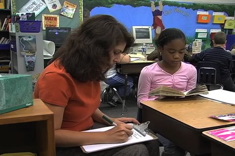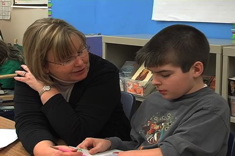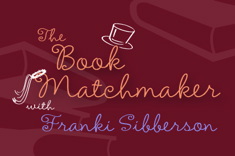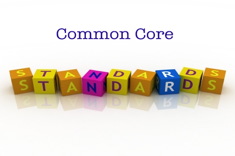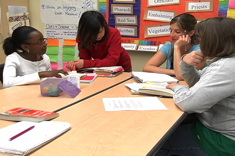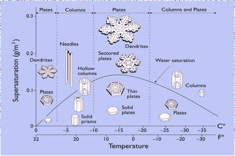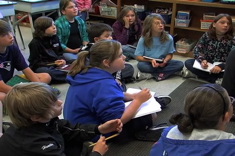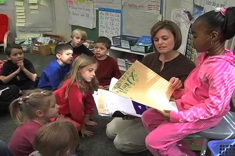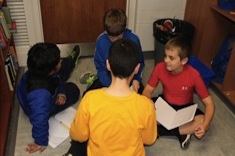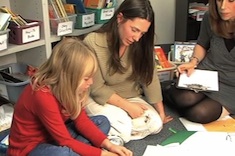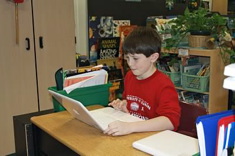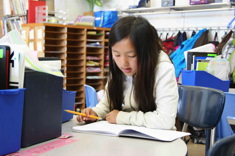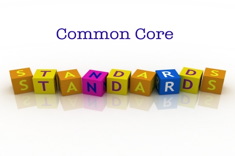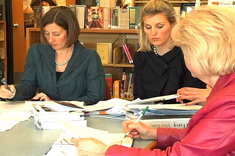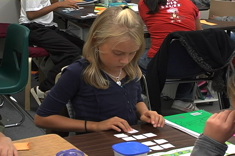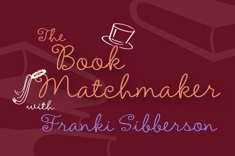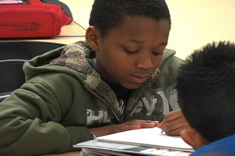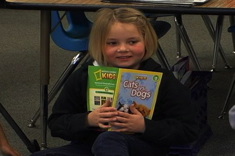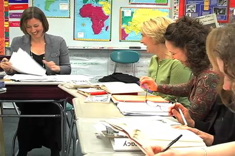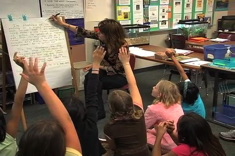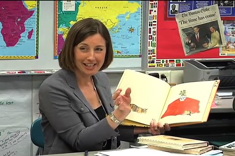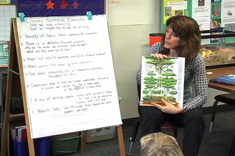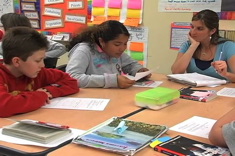Library
Choice Literacy Articles & Videos
The Choice Literacy library contains over 3,000 articles and 900 videos from 150+ contributors. Classic Classroom and Literacy Leadership subscribers have access to the entire library. Content is updated continuously, with five to six new features published each week.
Latest Content
Conferring About Rereading Strategies
In this conference with a fourth grader, Aimee Buckner guides a child to think more deeply and critically about a book being read to the whole class, Goblins in the Castle.
Reading Conferences in 5th Grade
Karen Terlecky confers with her 5th graders during reading workshop.
Book Matchmaker: Graphic Novels for a 6th Grader
Franki Sibberson has graphic novel suggestions for 6th grade girls.
Respond, Reflect, Rejoice: The 3 Rs of Writing Celebrations
Ruth Ayres explains how teachers might put less focus on big, showy events, and more on the daily small pleasures and joys of writing success in classrooms.
Argumentative, Opinion, and Persuasive Writing in the Common Core
What does the Common Core have to say about persuasive writing? Jennifer Burton explains how she and her colleagues are teasing out the differences between opinion, argument, and persuasive writing with students, and helping them develop this type of writing in authentic ways
How Do We Structure Small Groups? (Part 3 of the Grouping Series)
Heather Rader synthesizes recommendations and provides examples of how grouping structures work in classrooms.
Standards and Magic: Digging Deep and Being Spontaneous with Infographics
If you’ve ever had 15 minutes or less to plan for a session with kids, you can appreciate the blend of panic and improvisation the experience inspires. Mary Lee Hahn devises an activity with an infographic for the 4th and 5th grade environmental science club at the last minute, and finds students exhibit many surprising literacy skills during the session.
Setting the Stage for Historical Fiction
In this demonstration lesson from a fifth-grade classroom, Aimee Buckner works with students to construct an anchor chart for understanding the genre of historical fiction.
More Productive Writing Share Sessions in First Grade
In this video from a first-grade classroom, Katie DiCesare demonstrates how she has made writing share time more productive by linking student work to recent lessons.
Inferring and Synthesis: Conferring Over Series Books
Beth Lawson shows how to get the most from a conference about series books in 3rd grade. Inferring and synthesis are discussed, as well as the use of written notes for making meaning from texts.
Grouping: Who? How Big? How Often?
In this first installment of a series on grouping, Heather Rader considers size, composition, and frequency.
If You Like Goosebumps . . .
Students still love the Goosebumps series, and teachers can build on that passion by introducing them to other texts with similar appeal. Franki Sibberson shares books at a variety of reading levels which tap into student fascination with things that go bump in the night.
Listen In: Magnifying a Moment in Writing
Sometimes using a prop can help young students understand a revision strategy. Heather Rader helps second-grader Sammi understand how to “magnify” a moment when revising her writing.
The Affect of Tech on Splrs
Heather Rader considers the cultural divide between teachers and students who are “screenagers” when it comes to texting. If u r getting LOLed out in ur classroom u might want 2 read this.
When It’s Time to Abandon Your Writing
Writers in the real world abandon drafts all the time, yet it’s a strategy which isn’t often encouraged in classrooms. Heather Rader considers the thorny issue of how teachers can promote this strategy, yet still deal well with those students who never finish any drafts.
Unpacking the Common Core Standards: First Grade Information Texts
Franki Sibberson designs a booklist for tackling information texts in first grade.
Building Community Protocols
Clare Landrigan and Tammy Mulligan share two of their favorite protocols for building community among educators.
6th Grade Word Sort
In this six-minute video, Pam Pogson leads an open word sort with her 6th grade students.
Book Matchmaker: 5th Grade English Language Learners
Robin Heist is an elementary teacher looking for books for her older English language learners who are reading below grade-level expectations.
“School” Writing at the End of the Year
Writing about education is important in Erin Ocon's middle school classroom. Although Erin's students are in the eighth grade, this is a terrific project for readers of any age, and could even be used schoolwide for closure and celebration.
Previewing Nonfiction
Teachers are adding more nonfiction to their classroom libraries, and looking for ways to promote nonfiction with students in light of the emphasis on nonfiction in the Common Core. Franki Sibberson share tips for previewing nonfiction with students.
Planning for a Demonstration Lesson Part 1
In this first installment of a video series, Clare Landrigan takes a team of grades 3-5 teachers through the steps of planning for a demonstration lesson.
Common Core Conversations: Vocabulary
Amanda Adrian and Heather Rader explore connections between the Common Core and vocabulary instruction.
Second-Grade Punctuation Conference
Beth Lawson confers with a second grader, assisting as she works on her punctuation skills.
Frogs as Learning Ambassadors Part 2: Literary Nonfiction in 4th Grade
Andrea Smith explains how the classroom environment influences instruction in the second installment of this video series.
Planning for a Demonstration Lesson Part 2
In this second installment of a two-part video series, Clare Landrigan takes a team of grades 3-5 teachers through the steps of selecting a book for a demonstration lesson.
Digging Into Literary Nonfiction
Andrea Smith and her 4th grade students use an article from National Geographic for Kids to chart literary nonfiction elements.
Guiding a Struggling Middle School Book Club
What do you do about those book clubs that just don’t jell in your middle school classroom? Katie Doherty demonstrates how she guides a struggling group of sixth graders, helping them reflect and converse together.
The Sponge Summary Lesson Part 1
In this sequence of videos, Heather teaches a fourth-grade class, using the analogy of a sponge to explain how summaries work. In this first video excerpt, Heather reviews the work the class has already done on understanding the attributes of good summaries.
Best Practices in Spelling Instruction
Heather Rader wades through the research to find the best practices in spelling instruction.
Browse Content By
Type
Category
- Assessment Tools
- Big Fresh Archives
- Booklists
- Choice Numeracy
- Classroom Design
- Common Core
- Community Building
- Conferring
- Content Literacy
- Digital Literacy
- English Language Learners
- Equity
- Family Relations
- Free Samples
- Guiding Groups
- Leadership
- Literacy Coaches
- Mentor Texts
- Minilessons
- New Teacher Mentors
- Podcasts
- Poetry
- Quote Collections
- Reading Strategies
- Self Care
- Struggling and Striving Learners
- Talking and Listening
- Teacher Study Groups
- Teaching Reading
- Teaching Writing
- Word Study and Vocabulary
Author
- Melissa Quimby
- Nawal Qarooni
- Gwen Blumberg
- Julie Cox
- The Lead Learners
- Ruth Metcalfe
- Mallory Messenger
- Becca Burk
- Jodie Bailey
- Vivian Chen
- Mary Brower
- Stephanie Affinito
- Ruth Ayres
- Leigh Anne Eck
- Heather Fisher
- Shari Frost
- Julie Johnson
- Suzy Kaback
- Clare Landrigan
- Gigi McAllister
- Shirl McPhillips
- Melanie Meehan
- Cathy Mere
- Debbie Miller
- Tara Barnett and Kate Mills
- Tammy Mulligan
- Dana Murphy
- Bitsy Parks
- David Pittman
- Brenda Power
- Heather Rader
- Matt Renwick
- Mandy Robek
- Christy Rush-Levine
- Gretchen Schroeder
- Jen Schwanke
- Brian Sepe
- Katherine Sokolowski
- Stella Villalba
- Jennifer Vincent
Grade Level
Choice Literacy Membership
Articles
Get full access to all Choice Literacy article content
Videos
Get full access to all Choice Literacy video content
Courses
Access Choice Literacy course curriculum and training

